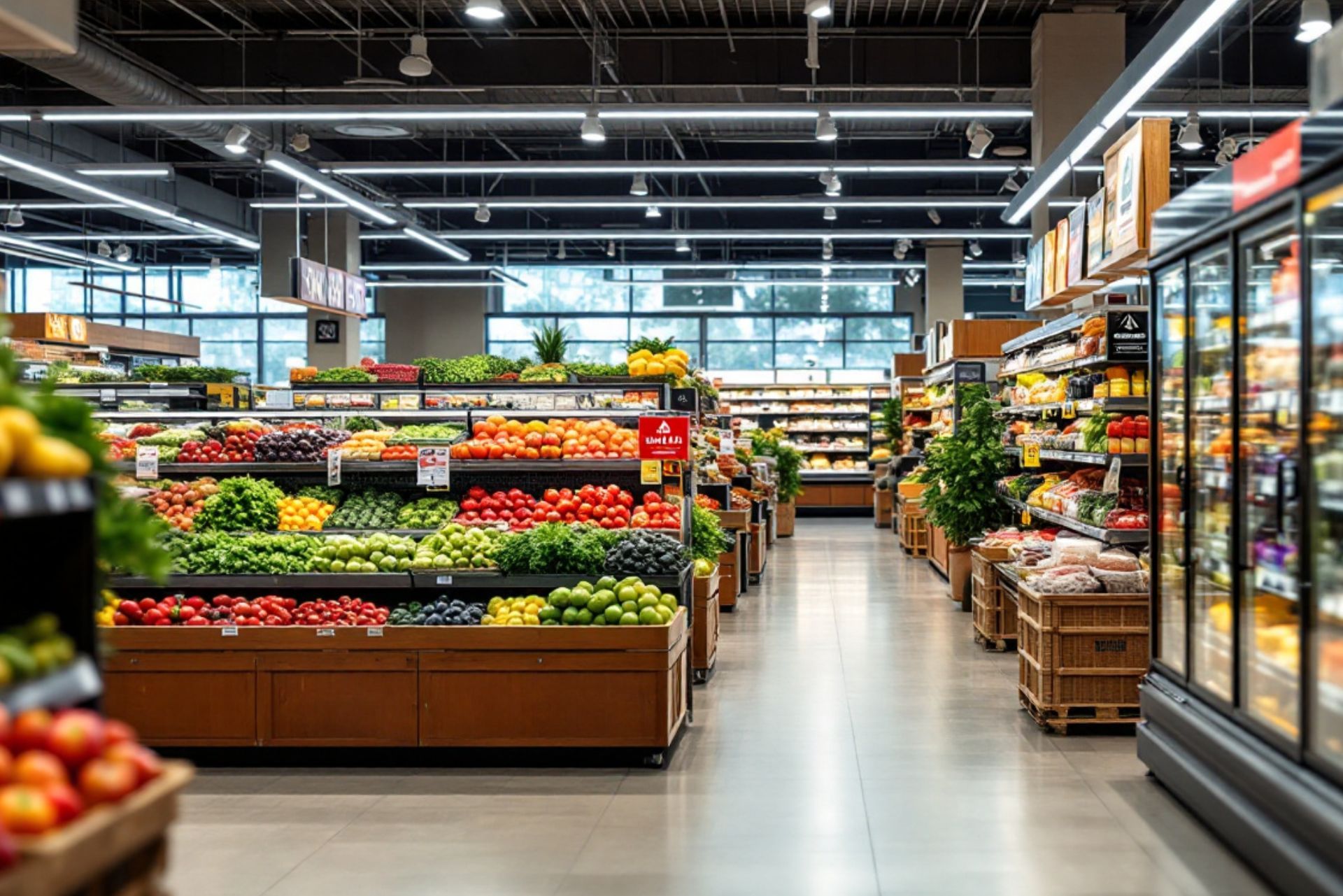Top 3 Recommended Business Policies
Index
Contact Us
Operating a grocery store in Maryland entails unique challenges and responsibilities, not the least of which is ensuring that your business is adequately protected through the right insurance. Grocery store insurance can be complex, but understanding its facets can help you safeguard your investment. This article details key aspects of grocery store insurance that every owner should know, especially in the context of Maryland.
Understanding the Basics of Grocery Store Insurance
Grocery store insurance is designed to protect your business from various risks including property damage, liability claims, and employee injuries. It is essential for any grocery store owner to navigate through the maze of insurance options available.
Importance of Insurance for Grocery Stores
The primary role of insurance is to mitigate risks. For grocery stores, which often deal with high foot traffic and numerous perishable items, a comprehensive insurance policy can mean the difference between business continuity and devastating financial losses. Insurance covers unexpected events like theft, fire, water damage, and lawsuits, allowing you to focus on running your business. Moreover, the grocery industry is particularly vulnerable to fluctuations in market conditions and consumer behavior. A well-structured insurance plan can provide a safety net that helps store owners weather these uncertainties and maintain stability in their operations.
Types of Coverage for Grocery Stores
When it comes to grocery store insurance, several types of coverage are essential. These may include:
- Property Insurance: This covers damage to your physical location and assets including inventory, equipment, and fixtures.
- Liability Insurance: Essential for protecting your business from claims due to injuries or damages that might occur on your premises.
- Workers' Compensation: A legal requirement that protects employees who get injured while on the job.
- Business Interruption Insurance: Helps cover lost income and operational costs during periods when your grocery store cannot operate due to covered events.
In addition to these core coverages, grocery store owners may also consider specialized policies such as product liability insurance, which protects against claims arising from foodborne illnesses or product defects. Given the nature of the grocery business, where the risk of contamination can be a serious concern, having this additional layer of protection can be invaluable. Furthermore,
cyber liability insurance is increasingly relevant in today’s digital age, especially as grocery stores adopt e-commerce platforms and digital payment systems. This coverage can safeguard against data breaches and cyberattacks, ensuring that sensitive customer information remains secure.

Specifics of Maryland Grocery Store Insurance
Maryland has specific regulations and conditions that affect grocery store insurance. Understanding these nuances is crucial for compliance and optimal coverage.
State Regulations for Grocery Store Insurance
Each state has its own set of insurance requirements. In Maryland, grocery store owners must adhere to specific liability coverage limits and workers' compensation regulations. Being informed about these regulations ensures you are not only compliant but also adequately protected. Additionally, Maryland mandates that grocery stores maintain certain safety standards to minimize risks associated with food handling and storage. This includes regular inspections and adherence to health codes, which can also impact insurance premiums and coverage options.
Finding a Local Insurance Provider
When searching for an insurance provider in Maryland, it’s advisable to work with a local agent who understands the unique needs of grocery stores in the area. Local agents are more likely to be familiar with state regulations, market conditions, and can offer tailored coverage plans. Look for insurance providers who specialize in business insurance, specifically for the food industry. Furthermore, consider seeking out agents who have experience with claims related to grocery stores, as they can provide valuable insights into the types of coverage that are most beneficial, such as spoilage insurance or coverage for equipment breakdowns. Engaging with a knowledgeable local agent can also facilitate smoother communication during the claims process, ensuring that you receive timely assistance when needed.
Evaluating Your Insurance Needs
Understanding your grocery store's specific needs is key to obtaining the right insurance coverage. Evaluating risks and coverage levels ensures good financial protection. Every grocery store is unique, and the insurance requirements can vary significantly based on a multitude of factors, including size, location, and the demographic of the customer base. By carefully analyzing these elements, store owners can tailor their insurance policies to effectively safeguard their business against potential threats.
Assessing Your Store's Risks
Start by conducting a detailed risk assessment of your grocery store. Consider factors like:
- Location: Areas with higher crime rates may require different coverage considerations.
- Type of Products: Perishable goods may necessitate specific policies regarding spoilage.
- Employee Safety: Evaluate the safety measures in place and the potential for worker injuries.
Additionally, think about external risks such as natural disasters. Depending on your geographical location, you may need to consider coverage for events like floods, earthquakes, or hurricanes. Seasonal fluctuations in customer traffic can also impact your risk profile; for instance, holiday seasons may bring increased foot traffic but also a higher chance of accidents or theft. Understanding these dynamics will help you create a comprehensive risk assessment that covers all bases.
Determining the Right Coverage Level
After assessing risks, determining the appropriate coverage level becomes crucial. This involves analyzing factors like the value of your inventory, liabilities, and the overall cost of operating your grocery store. Consulting with an insurance professional can provide insights into the appropriate coverage limits. They can help you understand the nuances of different policies and what each one covers, from general liability to property insurance and beyond.
Moreover, it's important to regularly review and update your coverage as your business evolves. As you expand your product offerings or make renovations to your store, your insurance needs may change. Keeping in touch with your insurance agent and conducting annual reviews can ensure that you are not underinsured or overpaying for unnecessary coverage. This proactive approach not only protects your assets but also gives you peace of mind, allowing you to focus on running your grocery store effectively.
The Cost of Grocery Store Insurance in Maryland
The cost of grocery store insurance in Maryland can vary greatly depending on several factors. Understanding these elements might help you budget more effectively. With the grocery industry constantly evolving, it's essential for store owners to stay informed about their insurance needs and the potential costs involved.
Factors Influencing Insurance Premiums
Various factors can influence your insurance premiums, including:
- Business Size: Larger stores typically incur higher insurance costs due to more inventory and higher risks. The scale of operations can also lead to increased liability exposure, particularly if the store has a deli or bakery where food safety is paramount.
- Claim History: A history of frequent claims can result in higher premiums. Insurers often view a pattern of claims as indicative of ongoing risks, which can lead to increased scrutiny and higher rates in subsequent policy renewals.
- Location: Stores in more populated or crime-prone areas may face increased insurance costs. Additionally, geographic factors such as proximity to flood zones or areas prone to natural disasters can further impact premiums, as insurers assess the likelihood of property damage.
Ways to Lower Your Insurance Costs
To manage costs, consider implementing safety measures to minimize risk and improve your insurance profile. Strategies such as employee training, security systems, and regular maintenance checks can help lower premiums. Additionally, bundling various insurance policies with one provider may lead to discounts. Investing in comprehensive employee safety programs not only protects your staff but also demonstrates to insurers that you are proactive about risk management.
Furthermore, reviewing your insurance coverage annually can help ensure that you are not over-insured or under-insured. As your grocery store evolves, so do its risks and needs. Engaging with an insurance broker who specializes in retail can provide valuable insights into the best coverage options available, tailored specifically for your business model. They can help you navigate the complexities of policy terms and conditions, ensuring you have the right protection without unnecessary expenses.

Claiming Insurance for Grocery Stores
The process of claiming insurance can be daunting, especially in the event of a disruption to your business. Knowing what to do can expedite this process.
When to File a Claim
Filing a claim promptly after an incident is vital. Whether it’s theft, natural disasters, or a liability situation, timely reporting to your insurance provider can impact the outcome of your claim. Documenting the event thoroughly also aids in relaying necessary information to the insurer. Additionally, being aware of your policy's specific time limits for filing claims can prevent unnecessary delays and complications. For instance, some policies may require claims to be filed within a certain number of days following an incident, so it’s crucial to act quickly.
The Claim Process Explained
The claim process generally involves the following steps:
- Notifying your insurance provider about the incident and filing a formal claim.
- Providing comprehensive documentation of the loss, including photographs, incident reports, and any related records.
- Contingent on the severity of the claim, an adjuster may be assigned to assess the damages.
- Negotiating a settlement based on the details provided and the terms of your policy.
Throughout this process, communication is key. Keeping a detailed log of all interactions with your insurance company, including dates, names, and the content of discussions, can be invaluable. This not only helps in tracking the progress of your claim but also serves as a record should any disputes arise later. Furthermore, understanding the nuances of your policy can empower you during negotiations, as it allows you to advocate effectively for your rightful compensation. Each grocery store's situation is unique, and being well-prepared can make a significant difference in the outcome of your claim.
Frequently Asked Questions about Maryland Grocery Store Insurance
As a grocery store owner, you may have additional questions about navigating insurance policies and requirements.
Common Misconceptions about Grocery Store Insurance
There are several misconceptions surrounding grocery store insurance. One is the belief that all policies are the same. In reality, coverage can vary widely based on your specific needs, location, and the types of goods sold. Another misconception is that liability coverage is sufficient; often, supplemental policies may be necessary for complete protection. For instance, if your grocery store sells alcohol or perishable goods, you may need specific endorsements that address the unique risks associated with those products. Understanding these nuances is crucial to ensuring that your business is fully protected against potential liabilities.
Expert Advice for First-Time Insurance Buyers
If you are purchasing insurance for the first time, consider seeking expert advice. Professional brokers can guide you through the complexities of different policies and help tailor coverage to fit your grocery store’s specific needs. Additionally, always read the fine print of your insurance contract to understand exclusions and limitations. It can also be beneficial to ask about bundling options, as many insurers offer discounts for combining multiple types of coverage, such as property, liability, and workers' compensation. This not only saves money but also simplifies management of your insurance portfolio.
Moreover, staying informed about industry trends and changes in regulations can further enhance your understanding of the insurance landscape. For example, recent developments in food safety laws may impact the types of coverage you need. Engaging with local business associations or attending workshops can provide valuable insights and networking opportunities that may lead to better insurance solutions tailored to your grocery store's unique challenges. By being proactive and well-informed, you can navigate the complexities of grocery store insurance with greater confidence.
For over 40 years D.H. Lloyd & Associates has provided commercial insurance solutions covering multiple facet of business risk.
QUICK LINKS
CONTACT US
Phone:
202-223-1506
Email: contactus@dhlloyd.com
Address: 1625 K St NW, Washington, DC 20006, United States
All Rights Reserved | D.H. Lloyd & Associates | Privacy Policy | Legal Disclaimer | Sitemap | Built & SEO'd by Convirtue

